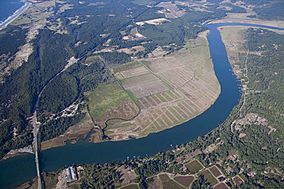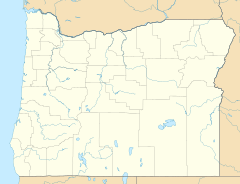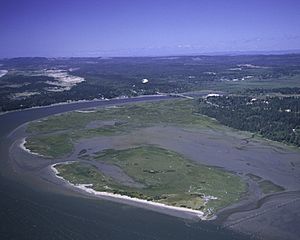Bandon Marsh National Wildlife Refuge facts for kids
Quick facts for kids Bandon Marsh National Wildlife Refuge |
|
|---|---|
|
IUCN Category IV (Habitat/Species Management Area)
|
|

Aerial view
|
|
| Location | Coos County, Oregon |
| Nearest city | Bandon, Oregon |
| Area | 864 acres (350 ha) |
| Governing body | U.S. Fish and Wildlife Service |
| Website | Bandon Marsh NWR |
The Bandon Marsh National Wildlife Refuge is a special protected area on the coast of Oregon. It's a place where wild animals and plants can live safely. This refuge is managed by the United States Fish and Wildlife Service.
It is one of six wildlife refuges that make up the Oregon Coast National Wildlife Refuge Complex. Many people who love to watch birds come here. They can see rare shorebirds like the ruff, Hudsonian godwit, and Mongolian plover. The refuge grew in 1999 and now covers about 889 acres. It has two main parts: the Bandon Marsh and the Ni-les'tun Unit.
Fun Things to Do at Bandon Marsh
Bandon Marsh is a great place for many outdoor activities. You can go hunting, fishing, or clamming here. It's also perfect for bird watching and photography. The refuge protects the largest tidal salt marsh in the Coquille River area.
The muddy areas, called mudflats, are full of interesting creatures. You can find clams, crabs, worms, and shrimp living there. These small animals attract many different birds. Migrating waterfowl and shorebirds visit the marsh. You might also spot coho salmon and the California brown pelican.
Some of the common shorebirds you might see include western and least sandpipers. Look for the semipalmated plover, black-bellied plover, and Pacific golden plover. Other visitors are the red phalarope, whimbrel, and dunlin.
The Ni-les'tun Unit: A Special Project
The Ni-les'tun Unit is a big project to help nature. It aims to bring back healthy habitats for fish and other wildlife. This unit has areas of both saltwater and freshwater marsh. It also includes land along the river, called riparian land.
This area is also very important for history. It protects a 4,500-year-old Native American archaeological site. This site belongs to the Coquille Indian Tribe. The refuge plans to restore the marsh here. This means letting saltwater and freshwater flow in naturally. This will help the mudflats and marsh plants grow back.
New tidal channels will connect different parts of the wildlife habitat. As the land becomes a healthy marsh again, many animals will benefit. Flocks of migratory birds will use it during their journeys. Young fish will also find a safe place to grow.
There are several places where you can stop and look out over the marsh. These overlooks are great for birders and photographers. Hunters, fishers, and clammers can also access the area. Remember to follow all state and federal rules when you visit. The Bandon Marsh is located just north of Bandon, Oregon. It's on the east side of the Coquille River, across from Bullards Beach State Park.
 | Shirley Ann Jackson |
 | Garett Morgan |
 | J. Ernest Wilkins Jr. |
 | Elijah McCoy |



